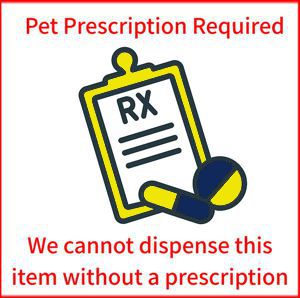
2.5mg/20mg Cardalis Tablet for Dogs - per tablet
721943
2.5mg/20mg Cardalis for Dogs is a new treatment for congestive heart failure and combines the diuretic Spironolactone with the ACE inhibitor Benazeapril.
Cardalis 2.5mg/20mg is a prescription medication used for the treatment of congestive heart failure caused by chronic degenerative valvular disease in dogs (with diuretic support as appropriate). Cardalis is also used to treat conditions such as acute mitral insufficiency, chronic mitral insufficiency, and heart murmur.
VET PRESCRIPTION REQUIRED.
Product Features
- Pack Size: - Sold Individually
- Target Animal: - Dog (Canine)
- Pet Prescription Required?: - Yes (For UK Orders)
- Active Ingredient: - Benazepril and Spironolactone
- Product Name: - 2.5mg/20mg Cardalis Tablet for Dogs - per tablet
More Information
Description
Cardalis for Dogs
Cardalis Tablets may only be supplied with a valid veterinary prescription issued by your vet. You should only purchase Cardalis tablets if you have or are in the process of arranging such a prescription. See information bar for further details.
2.5mg/20mg Cardalis Tablet
Cardalis is used for the treatment of congestive heart failure caused by chronic degenerative valvular disease in dogs (with diuretic support as appropriate).
Dosage and administration
Oral use. Cardalis is a fixed combination product and should only be used in dogs which require both active substances to be administered concomitantly at this fixed dose.
Cardalis tablets should be administered to the dog once a day using a dosage of 0.25 mg/kg bodyweight (bw) benazepril hydrochloride (HCl) and 2 mg/kg bodyweight spironolactone.
Cardalis tablets should be administered with food, either mixed with a small amount of food offered to the dog just prior to the main meal, or with the meal itself.
Cardalis Dosages are as follow:
2.5 - 5kg : 1/2 tablet Cardalis 2.5mg/20mg
5 - 10 kg: 1 tablet Cardalis 2.5 mg/20 mg
10 - 20kg : 1 tablet Cardalis 5 mg/40 mg
20 - 40kg : 1 tablet Cardalis 10 mg/80 mg
40 - 60kg : 1 + 1/2 tablet Cardalis 10 mg/80 mg
60 - 80kg : 2 tablets Cardalis 10 mg/80 mg
Contraindications, warnings etc
Do not use Cardalis during pregnancy and lactation; embryotoxic effects (foetal urinary tract malformation) were seen in trials of benazepril with laboratory animals (rats) at maternally non-toxic doses.
Do not use Cardalis in dogs intended or used for breeding.
Do not use Cardalis in dogs suffering from hypoadrenocorticism, hyperkalaemia or hyponatraemia.
Do not administer in conjunction with Non Steroidal Anti-Inflammatory Drugs (NSAIDs) to dogs with renal insufficiency.
Do not use Cardalis in case of hypersensitivity to Angiotensin-Converting Enzyme inhibitors (ACE inhibitors) or to any of the excipients.
Do not use Cardalis in cases of cardiac output failure due to aortic or pulmonary stenosis.
Special precautions for use in animals
Kidney function and serum potassium levels should be evaluated before initiating the treatment with benazepril and spironolactone, especially in dogs which may suffer hypoadrenocorticism, hyperkalaemia or hyponatraemia. Unlike in humans, an increased incidence of hyperkalaemia was not observed in clinical trials performed in dogs with this combination. However, regular monitoring of renal function and serum potassium levels is recommended in dogs with renal impairment, as they may have an increased risk of hyperkalaemia during treatment with this product.
Due to the antiandrogenic effect of spironolactone, it is not recommended to administer Cardalis to growing dogs.
To be used with caution to treat dogs with hepatic dysfunction because it may alter the extensive biotransformation of spironolactone in liver.
Adverse reactions
A reversible prostatic atrophy is often observed in entire male dogs treated with Cardalis.
Interaction with other medicinal products and other forms of interaction
Furosemide has been used together with this combination of benazepril hydrochloride and spironolactone in dogs with heart failure without any clinical evidence of adverse interactions.
The concomitant administration of this veterinary medicinal product with other anti-hypertensive agents (e.g. calcium channel blockers, β-blockers or diuretics), anaesthetics or sedatives may potentially lead to additive hypotensive effects.
The concomitant administration of this veterinary medicinal product with other potassium-sparing treatments (such as ß-blockers, calcium channels blockers, angiotensin receptor blockers) may potentially lead to hyperkalaemia.
The concomitant use of NSAIDs with this veterinary medicinal product may reduce its anti-hypertensive effect, its natriuretic effect and increase the level of serum potassium. Therefore, dogs treated concomitantly with an NSAID should be closely monitored and correctly hydrated.
The administration of deoxycorticosterone with Cardalis may lead to a moderate reduction of the natriuretic effects (reduction of urinary sodium excretion) of spironolactone.
Spironolactone decreases digoxin elimination and hence raises digoxin plasma concentration. As the therapeutic index for digoxin is very narrow, it is advisable to monitor closely dogs receiving both digoxin and a combination of benazepril hydrochloride and spironolactone.
Spironolactone may cause both induction and inhibition of cytochrome P450 enzymes and could affect the metabolism of other substances utilizing these metabolic pathways. Therefore, the product should be used with caution with other veterinary medicinal products which induce, inhibit, or which are metabolised by these enzymes.
Overdose
After administration of up to 10 times the recommended dose of Cardalis (2.5 mg/kg bw benazepril hydrochloride, 20 mg/kg bw spironolactone) to healthy dogs, dose dependant adverse effects were noted.
Daily overdoses to healthy dogs, that is, 6 times (1.5 mg/kg bw benazepril hydrochloride and 12 mg/kg bw spironolactone) and 10 times (2.5 mg/kg bw benazepril hydrochloride and 20 mg/kg bw spironolactone) the recommended dose, led to a slight dose related decrease in red cell mass. However, this very slight decrease was transient, the red cell mass remained within the normal range, and the finding was not considered to be of clinical importance. A dose related but moderate compensatory physiological hypertrophy of the zona glomerulosa of the adrenal glands was also observed at doses of 3 times and greater of the recommended dose. This hypertrophy does not seem to be linked to any pathology and was observed to be reversible upon discontinuation of the treatment.
In case of the accidental ingestion by a dog of many Cardalis tablets, there is no specific antidote or treatment. It is therefore recommended to induce vomiting, and then carry out gastric lavage (depending on the risk assessment) and monitor electrolytes. Symptomatic treatment, e.g., fluid therapy, should also be provided.
Special precautions to be taken by the person administering the veterinary medicinal product to animals
Wash hands after use.
People with known hypersensitivity to benazepril or spironolactone should avoid contact with the veterinary medicinal product.
Pregnant women should take special care to avoid accidental oral exposure because ACE inhibitors have been found to affect the unborn child during pregnancy in humans.
In case of accidental ingestion, seek medical advice immediately and show the package leaflet or the label to the physician.
For animal use only. Keep out of reach and sight of children. Any unused veterinary medicinal product or waste materials derived from such veterinary medicinal products should be disposed of in accordance with local requirements.
Pharmaceutical precautions
Cardalis does not require any special storage conditions. Shelf-life after first opening: 6 months.
Legal Category
Cardalis is a POM-V (Pet Prescription Required)
You may also like

2.5mg Fortekor Palatable Tablet for Cats and Dogs - per Tablet
2.5mg Fortekor Flavour is a veterinary medication formulated for the treatment of heart failure in dogs and chronic renal insufficiency in cats. The active ingredient in Fortekor, benazepril, is an angiotensin-converting enzyme (ACE) inhibitor that plays a vital role in managing these health conditions. With its flavoured formulation, Fortekor makes it easier for pet owners to administer the medication to their pets, ensuring better compliance and more effective treatment outcomes.
Fortekor's primary action comes from its active ingredient, benazepril, which functions as an ACE inhibitor. In cases of heart failure in dogs, Fortekor helps improve blood flow by preventing the constriction of blood vessels, thus enhancing the heart's efficiency in pumping blood throughout the body. This ultimately results in a reduction of symptoms associated with heart failure, such as fatigue, shortness of breath, and fluid retention, improving the dog's overall quality of life.
VET PRESCRIPTION REQUIRED

20mg Furosemide/Frusemide Tablet - per Tablet
Please Note: We can only supply Frusemide Tablets as part of a complete heart medication order. We cannot supply Frusemide Tablets on their own. Please do not order Frusemide Tablets on their own.
20mg Frusemide Tablets are a potent 'loop' diuretic used in the treatment of oedema. Conditions suitable for treatment include pulmonary oedema and hepatic or renal dysfunction. VET PRESCRIPTION REQUIRED

5mg Nelio for Dogs - Individual Tablet
Nelio is used for the treatment of congestive heart failure in dogs and cats. VET PRESCRIPTION REQUIRED

Vetmedin 1.25mg Flavour Tablet - per Tablet
Vetmedin 1.25mg Tablets are used for the treatment of canine congestive heart failure in smaller dogs originating from dilated cardiomyopathy or valvular insufficiency. VET PRESCRIPTION REQUIRED





